Engagebay
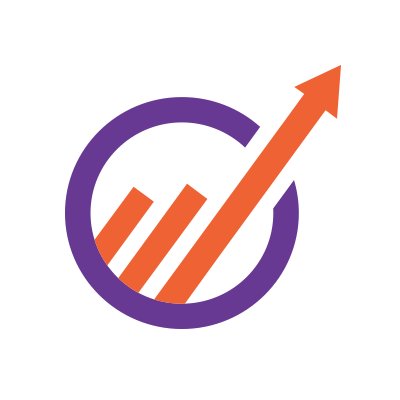
- All-in-one CRM platform
- Email marketing automation
- Sales and lead management
- Helpdesk ticketing system
- Landing page builder
Freshworks

- Multi-channel customer support
- AI-powered chatbots
- Helpdesk and ticketing
- CRM and sales automation
- Knowledge base creation
Zendesk

- Omnichannel support solutions
- Ticketing and live chat
- Knowledge base management
- AI-driven customer service
- Reporting and analytics
If you are at a stage in business where you are generating a high volume of leads per day or launching a new venture, a CRM is the ideal tool to organize all your data and optimize the customer journey.
Today, I will be discussing the Best CRM for ecommerce platforms available on the market for your e-commerce business. You can increase your revenue for sure if you choose the best CRM for your E-commerce business.
I will provide a comprehensive overview of seven CRM tools. You will get the following information in this article:
Bottomline Introduction: There are dozens of CRM software available in the market. You need to have clarity and understanding of the CRM you are going to purchase. Currently, Engagebay CRM is the best option available in the market for e-commerce business. They provide all the required pre and post-sales services. This is the best CRM software for boosting your leads generation and revenue.
Let’s proceed with today’s topic. You will learn about all these tools, including their overviews, pros, cons, and more. This will help you make a sound judgment about starting or boosting your e-commerce business.
Before delving deeper into the description of tools, it is essential to understand what CRM stands for.
What is CRM?
CRM stands for Customer Relationship Management. It’s a type of software that helps businesses manage and analyze interactions with their customers.
By utilizing CRM, companies can streamline their processes, foster stronger customer relationships, boost sales, and enhance customer service.
The software collects data from various communication channels, including a company’s website, telephone, email, live chat, and social media.
This enables businesses to gain a deeper understanding of their target audience and develop more effective strategies to cater to their needs, ultimately leading to improved customer support and satisfaction.
The 7 Best CRM for Ecommerce 2026
In the e-commerce business context, CRM helps with lead generation, conversion, and the interactive customer journey. Let’s start by describing the tools.
In the current market, Engagebay is the best CRM available for your e-commerce business. So we will start from Engagebay here.
1. Engagebay
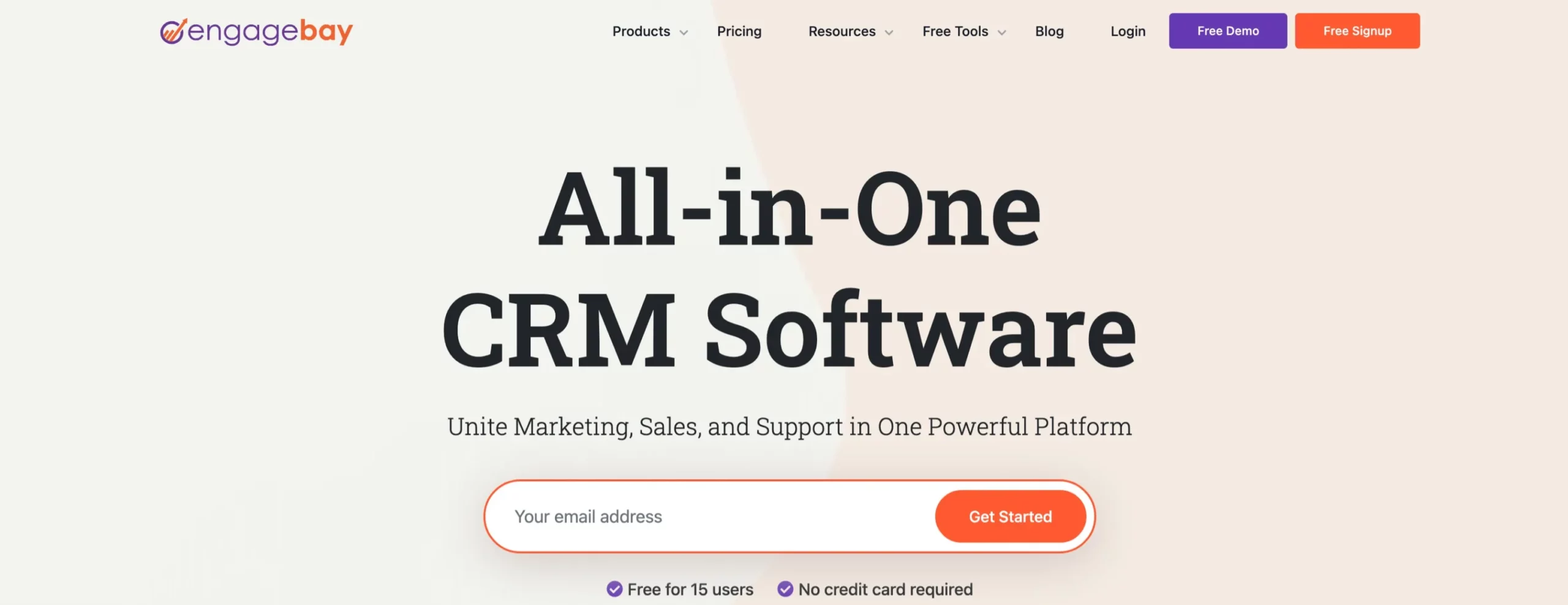
Engagebay is the best CRM software for your e-commerce business. It is the world’s most economical software with an all-in-one service. They have catered to more than 28000 clients globally.
Engagebay’s Customer Relationship Management (CRM) software helps your business organize email lists, sales pipelines, and track deals to increase sales and revenue.
You can find everything you need from one CRM. Here, you will get CRM software, Marketing Automation, Help Desk software, and live chat software in one place.
Features:
- CRM Software: You can store unlimited leads and data on their CRM Software. The sales and marketing team can track and review all the data in one place.
- Marketing Automation: Their automated marketing software handles all the backend work, allowing you to focus solely on your business. You can send customized emails to your target audience easily with their automated platform.
- Helpdesk Software: Their helpdesk software has been designed to provide the best UX and UI. It provides prompt and human responses in a timely manner.
- Live chat software: Clients can also utilize the live chat software service for enhanced customer interaction. It will boost customer trust and, eventually, conversions for the business.
Pros and Cons of Engagebay
Pros
- All-in-one marketing, sales, and support platform.
- Affordable pricing, especially for small businesses.
- Easy-to-use interface with a smooth learning curve.
- Robust automation for sales and marketing workflows.
- Great customer support with responsive assistance.
Cons
- Limited advanced features in lower-tier plans.
- Some integrations are not as extensive.
- Can be slow with large contact lists.
2. Freshworks
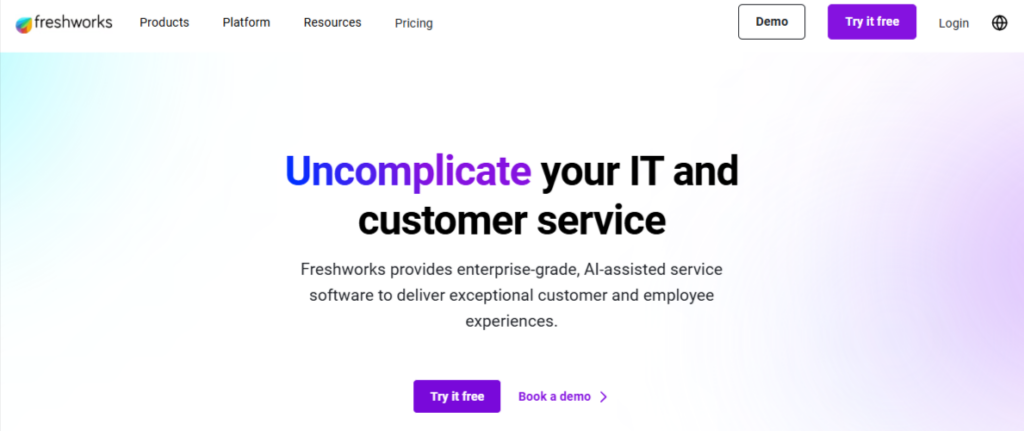
Freshworks is another leading CRM software for e-commerce businesses. They have handled more than 40000 clients globally and many more to come.
Their software is easy to use and requires minimal customization. They are a Chennai-based company that has crossed the revenue mark of over $ 100 million in 2018.
Features:
- Analytics to target customer journey: Through this tool, you can provide relevant insights into the customer journey, not only from some specific points. Your team can generate custom customer reports.
- Neo Admin Center: With their Neo Admin Center, you can access all your groups and accounts in one single place. Easy to manage and organize. They call it unified account management.
- Collaboration platform: They offer a single place to communicate across products and share with the team. It makes work hassle-free, and no need to switch between tabs.
- Pay for events you publish: With this option, there is no extra burden of server hosting, management, etc. You pay when you post an event for your business.
- One comprehensive touchpoint: Freshworks software captures data from all touchpoints during the customer journey. From one place, your team can plan specific customer targeting and segmenting.
Pros and Cons of Freshworks
Pros
- Easy-to-use interface with quick setup.
- Multi-channel customer support (email, chat, calls).
- AI-powered chatbots for enhanced automation.
- Robust CRM and sales automation features.
- Excellent reporting and analytics tools.
Cons
- Limited customization options for some features.
- Can be pricey for small businesses.
- Occasional delays in response time from support.
3. Zendesk
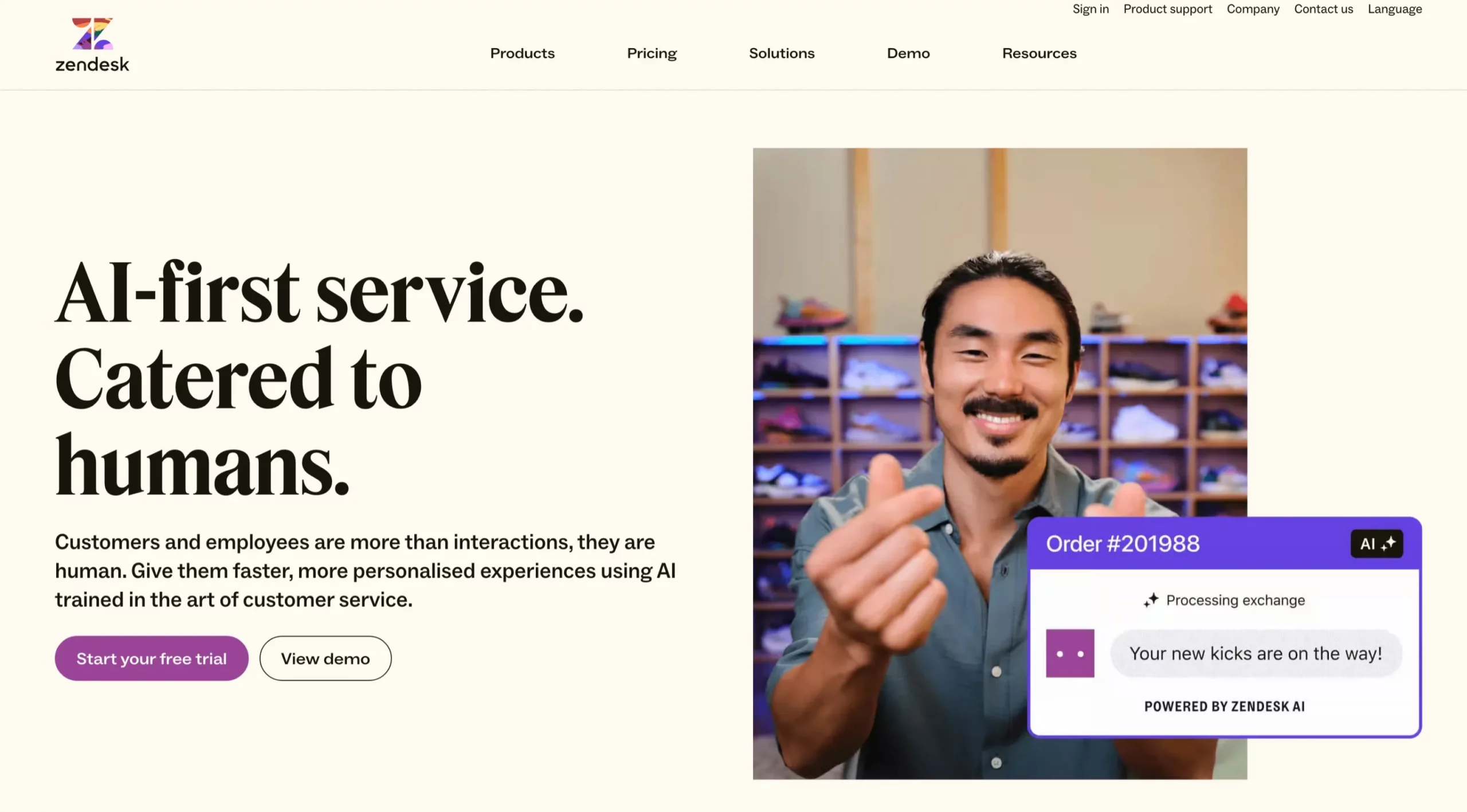
Zendesk is a leading CRM software for e-commerce businesses. This San Francisco-based company has been providing automated CRM software since its founding in 2007.
It has a market capitalization of $ 17.3 billion. It offers various CRM services to enhance your customer journey, driving sales and revenue growth.
Features:
- Customized Support Solution: At Zendesk, customer experience is their focal point. As your business grows, supply-side issues become more prevalent.
- A CRM for Start-ups: Zendesk offers exclusive benefits for those starting their ventures. With sign-up, they provide up to 50 agents with 6 months of credit.
- Automation and Dynamic Workplace: Zendesk provides a dynamic workplace with AI-enabled automation. This CRM will help your team to work faster and smarter and target customers more intelligently.
Pros and Cons of Zendesk
Pros
- Powerful omnichannel support across multiple platforms.
- Easy-to-use ticketing and customer support management.
- AI-driven automation and chatbots for efficiency.
- Highly customizable to suit business needs.
- Comprehensive reporting and analytics tools.
Cons
- Pricing can be expensive for smaller businesses.
- Steep learning curve for new users.
- Limited features in lower-tier plans.
4. Leadsquared
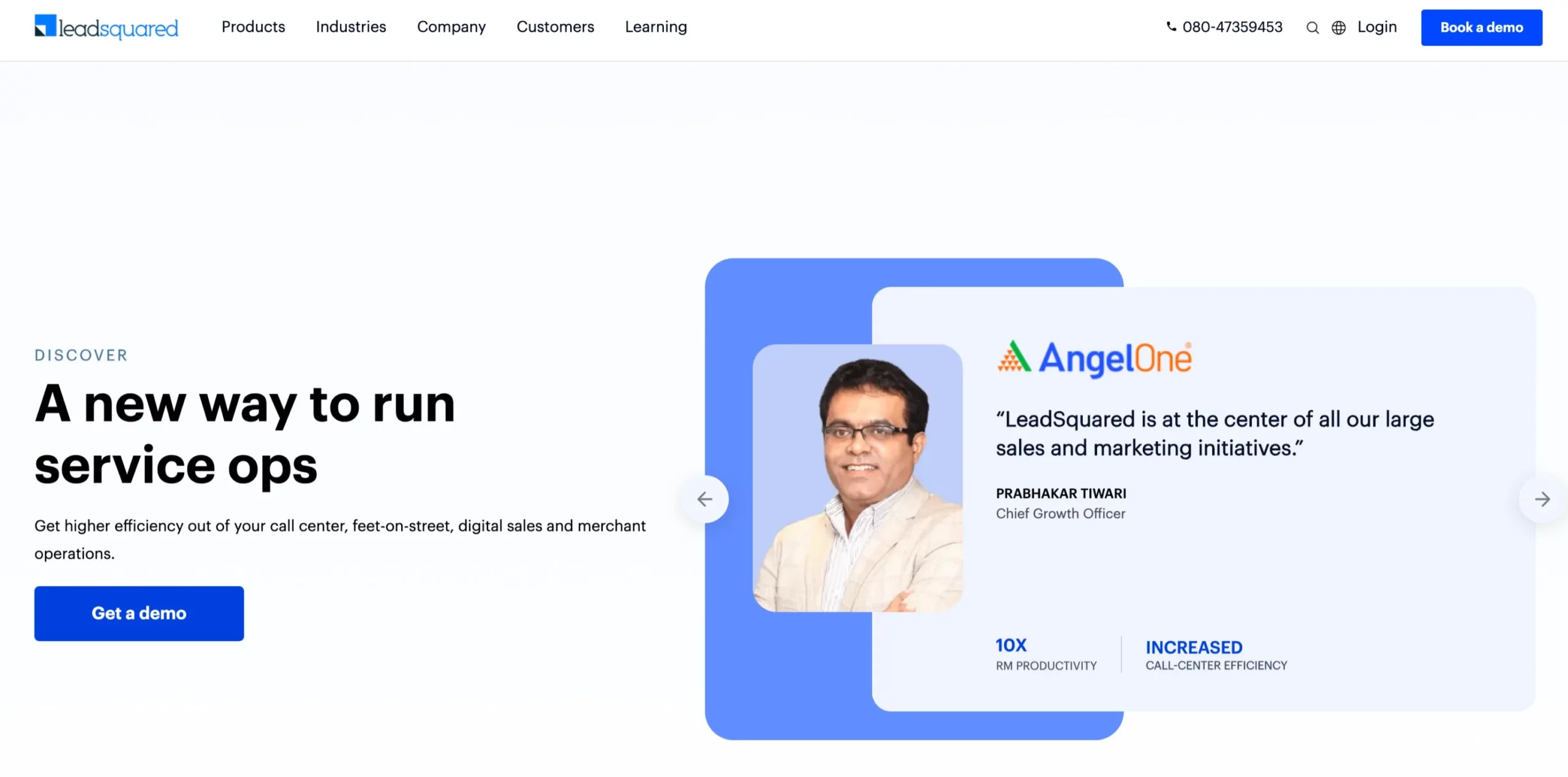
Bangalore-based CRM software provider Leadsquared was established in 2011.
Their marketing automation and sales execution CRM allows eCommerce and other businesses to improve their customer experience and conversions.
They help B2B and B2C Businesses nurture, manage, and track their leads efficiently. They provide services in sales CRM, Marketing automation, integrations, conversions, and mobile CRM.
Features:
- Flexible workflows: You don’t need a coding process for sales workflows. Sketch and design as you wish. The sales procedure on Leadsquared is quite dynamic and flexible.
- Regimented Sales: With an automated system, you don’t have to waste your sales team’s skills. Segment and target specific audiences with Leadsquared and assign a sales agent for each job.
- Remote work planning: You can plan all the staff working in the digital field and call on one platform.
- Always connected: Leadsquared brings all your employees and processes together on a single, unified platform. You can map distributed teams, sales touchpoints, and all processes on one single platform.
Pros and Cons of Leadsquared
Pros
- Comprehensive lead management and nurturing features.
- Powerful marketing automation capabilities.
- Excellent email marketing and campaign tools.
- Seamless integrations with multiple third-party apps.
- Intuitive interface with easy navigation.
Cons
- Pricing can be high for small businesses.
- Limited reporting and analytics in lower plans.
- Customer support response time can vary.
5. Zoho
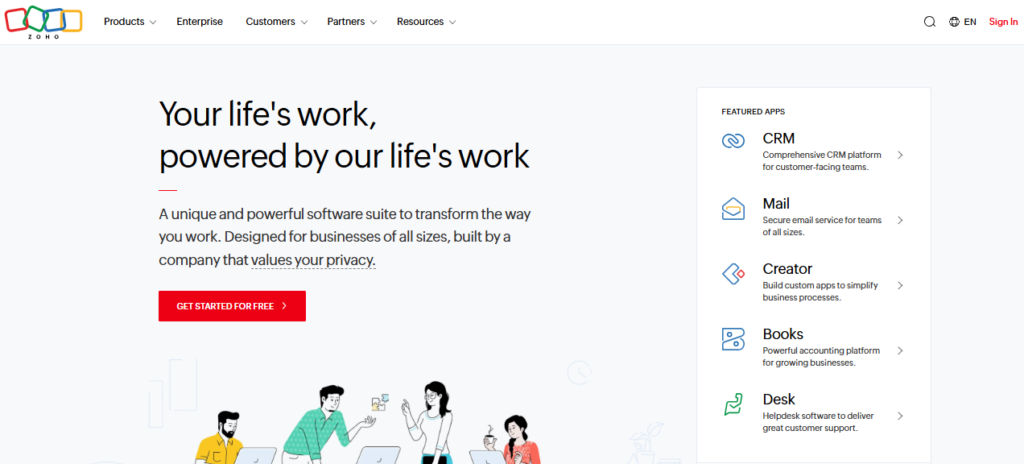
Zoho CRM software for eCommerce proudly serves over 150,000 clients in 180 countries globally. This trusted CRM software can transform your business by converting more leads, enhancing customer engagement, and driving revenue growth.
This is one of the most widely used Customer Relationship Management software programs available.
Zoho is an Indian multinational company established in 1996. Its headquarters are in Chennai, and it has offices in seven locations worldwide.
Features:
- Automated process for sales closures: With Zoho CRM Software, your sales team can devote their time and energy to target customers, creating and nurturing leads, and building relationships with customers.
- Analytics for better insights and communication: With their analytics tools, your team can monitor every aspect of the sales process.
Businesses can create customized dashboards with analytical widgets for sales, such as target meters, KPIs, charts, funnels, etc. - Track KPIs on the move: Users can access mobile CRM apps with Zoho CRM software. For an eCommerce business, sales are the ultimate objective.
- Secure data: Zoho offers state-of-the-art security controls. Your organization and products are secured with features such as two-factor authentication, IP restrictions, audit logs, and encryption.
Pros and Cons Of Zoho
Pros
- Comprehensive suite of integrated business tools.
- Highly customizable CRM and workflows.
- Affordable pricing with multiple plan options.
- Excellent automation for sales and marketing.
- Strong reporting and analytics capabilities.
Cons
- Steep learning curve for new users.
- Limited customer support on lower-tier plans.
- It can get overwhelming with many features to configure.
6. Act!
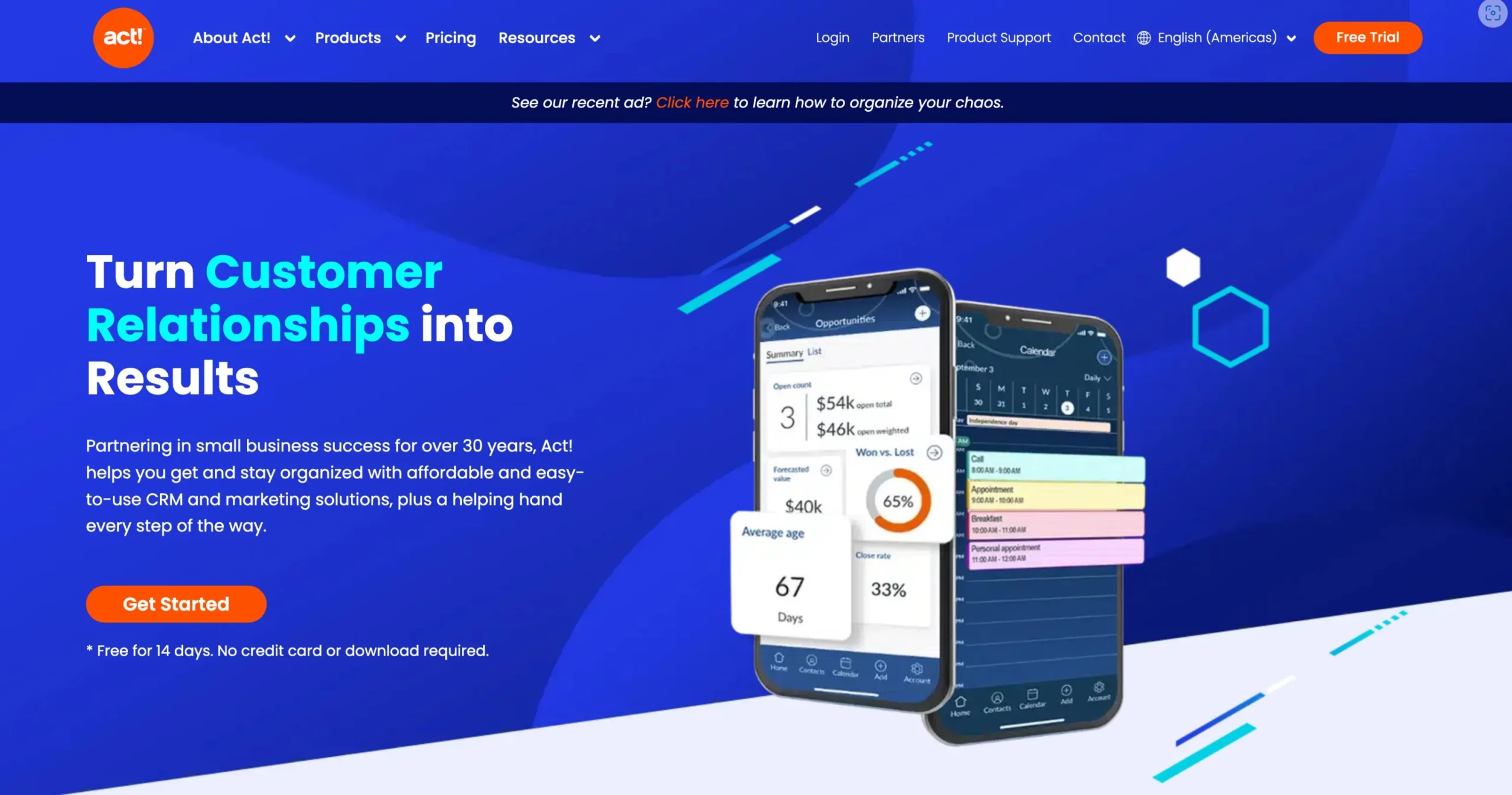
Act! CRM Software is a state-of-the-art customer relationship management tool for all kinds of businesses. Act! Keeps track of all customer touchpoints and clients’ products, stored in a single database.
This database can be shared within the team to achieve optimal performance. One of the key features of this software is its ability to integrate data with MS Office, Google Contacts, and Gmail.
This helps create a more effective marketing plan and targeted approach. Act! has reached a user base of more than 3.8 million.
Features:
- Marketing automation and CRM together: With automated marketing tools and CRM, your team can make more informed planning decisions. With proper planning, you can generate more leads, conversions, and sales for your e-commerce business. Possibilities are unlimited with Act! CRM software.
- Stay connected on all mobile devices: Their tool, Companion, helps you stay connected to all mobile devices. This free CRM mobile app will keep you connected with your iPhone, iPad, and Android devices.
- Microsoft Outlook Integrations: This is one of the unique features of the Software. Users can maintain a complete database on MS Office via Act! Contact Link. It will save time, create a seamless workflow, and allow integration in one place.
- Act! Connect: With Act! With the Connect tool, users can access thousands of relevant apps that enhance their CRM experience.
Pros and Cons of Act!
Pros
- Strong CRM and contact management features.
- Easy-to-use interface with quick setup.
- Excellent integration with Microsoft Office.
- Customizable reporting and analytics tools.
- Robust marketing automation capabilities.
Cons
- Pricing can be expensive for small businesses.
- Limited mobile app functionality and features.
- Some users find the interface outdated.
7. Maximizer

Vancouver, Canada-based CRM software provider Maximizer has worked with over 120,000 businesses worldwide. They have been in this business for 25 years and have helped companies with their sales, revenue, leads, and conversion.
Maximizer CRM offers all the features users require to succeed.
Feature:
- Dynamic and adaptive dashboard: Data analytics tools have been simplified in Maximizer CRM software. Anybody from your sales team can monitor through their dynamic and adaptive dashboard.
- Automated Campaign Creation and Tracking: Utilize Maximizer to identify relevant leads and maximize conversions. Clients can access and monitor everything from a single platform.
- Pipeline Management: Your sales pipeline should be effective, clear, and visible. With Maximizer’s all-in-one dashboard, your sales team can manage leads effectively, track them, and convert them for sales closure.
- Customer Support: A Happy and satisfied customer is the best brand ambassador for a brand. To ensure your eCommerce business’s success, it is essential to invest in customer support services. Maximizer CRM tool has made this simple for your business.
- Data deployment options: Maximizer offers two options to secure data. One is the cloud option. This method is cost-efficient and protected by Tier IV-certified data centers.
- Always Connected: With Maximizer, you’re always connected to your staff and customers. Their pre-built integrations enhance efficiency and provide a deeper understanding of the customer journey.
Pros and Cons of Maximizer
Pros
- Comprehensive CRM with sales and marketing tools.
- Customizable workflows and automation features.
- Excellent contact management and segmentation.
- Strong reporting and analytics capabilities.
- Easy integration with third-party applications.
Cons
- Pricing can be expensive for smaller businesses.
- User interface may feel outdated to some users.
- Steep learning curve for new users.
FAQs:
What benefits does CRM offer to an ecommerce business?
CRM software helps ecommerce businesses improve customer relations, increase sales, and enhance marketing efforts through personalized experiences and efficient data management.
How does CRM help with customer data?
CRM systems collect and analyze data from various interactions across different channels, providing valuable insights into customer behavior, preferences, and purchase history, which can be used to tailor marketing and sales strategies effectively.
Can CRM integrate with other ecommerce tools?
Yes, most CRM platforms can integrate seamlessly with other e-commerce tools, such as email marketing services, social media platforms, and accounting software, to provide a comprehensive business management solution.
What features should I look for in an ecommerce CRM?
Key features to look for include customer data management, marketing automation, customer segmentation, sales tracking, and analytics, as well as integration capabilities with your existing ecommerce platform.
How does CRM improve customer service?
CRM systems centralize customer information and interactions, enabling quicker and more personalized responses to customer inquiries and issues, which improves overall customer satisfaction and loyalty.
Quick Links:
- Engagebay Vs MailChimp
- HubSpot CRM vs MailChimp
- Top 10+ Best WordPress CRM
- 6 Best CRM for Sales
- Engagebay vs Zoho
Conclusion: Which Is The Best CRM For ECommerce?
As you come to the end of this article, you should keep in mind that there are several CRM tools available in the market.
I have shortlisted seven options based on our research and understanding; however, you should prepare your list before purchasing a subscription.
It’s unlikely that a single CRM tool will meet all of your business goals, so it’s essential to compare various options according to your requirements.
After conducting proper research, you should come to a sound judgment. Size and finances should not be factors that deter you from making a decision.
I would suggest using the Engagebay CRM tool for better conversion and relevant leads at an economical rate. It would not make a hole in your pocket.
